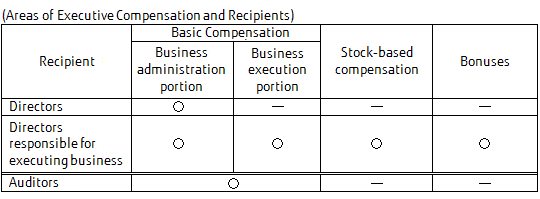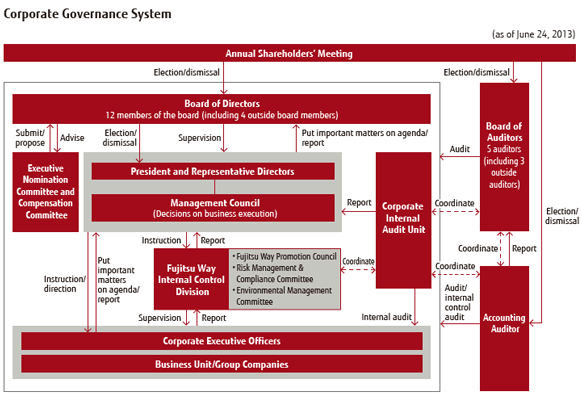Archived content
NOTE: this is an archived page and the content is likely to be out of date.
Corporate Governance
We are pursuing sound and efficient management and strengthening our governance structure for putting the Fujitsu Way into practice.
Basic Stance
In order to continuously raise the Fujitsu Group's corporate value, along with pursuing management efficiency, it is also necessary to control the risks that arise from business activities. Recognizing that strengthening corporate governance is essential to achieving this, the Board of Directors has articulated the Basic Stance on Internal Control Framework, and these measures are continuously implemented.
Furthermore, by separating management oversight and operational execution functions, we aim to accelerate the decision-making process and clarify management responsibilities. Along with creating constructive tension between oversight and execution functions, we are further enhancing the transparency and effectiveness of management by proactively appointing outside directors.
With respect to Group companies, we are pursuing total optimization for the Fujitsu Group by clarifying each group company's role and position in the process of generating value for the group as a whole and managing the group to continuously enhance its corporate value.
The Framework for Strengthening Corporate Governance
Fujitsu has established Executive Nomination and Compensation Committees in order to ensure the transparency and objectivity of the process for choosing candidates for the Board of Directors and determining their compensation, and to ensure the appropriateness of the compensation system and levels. The Executive Nomination and Compensation Committees act as consultative bodies to the Board of Directors. Taking into consideration the current business climate and anticipated trends, the Executive Nomination Committee makes recommendations of candidates (draft) for the Board of Directors, choosing candidates having objectivity in making management decisions, foresight and perceptiveness, and a superior character. The Compensation Committee is tasked with making recommendations on executive salaries and methods for calculating bonuses linked to financial performance, taking into consideration compensation levels at other companies with similar business activities, business scale, and other factors. The aim of this activity is to retain superior management talent, and provide effective incentives for improving the company's financial performance. Executive compensation will determined in accordance with the Executive Compensation Policy revised in an April 2011 meeting of the Board of Directors based on a report by the Committee.
In addition, we have adopted the processes in place, in accordance with laws and regulations, to ensure that conflicts of interest are avoided, including but not limited to obtaining approval from the Board of Directors.
[Reference] Executive Compensation Policy
To retain exceptional human resources required to manage the Fujitsu Group as a global ICT company, and to further strengthen the link between its compensation structure and business performance as well as shareholder value, while at the same time improving its transparency, the Group has established its Executive Compensation Policy as follows.
Executive compensation is comprised of the following: "Basic Compensation," specifically a fixed monthly salary in accordance with position and responsibilities; "Stock-based Compensation," which is a long-term incentive that emphasizes a connection to shareholder value; and "Bonuses" that are compensation linked to short-term business performance.
Basic Compensation
Basic compensation is provided to all directors and auditors based on position and responsibilities as compensation for duties involving business administration and the execution of corporate operations.
Stock-based Compensation
- Stock-based compensation, intended for directors responsible for executing business is a long-term performance incentive, with the amount to be paid determined based on a qualitative evaluation of medium- to long-term initiatives.
- Is provided for the purchase of Fujitsu shares, to be acquired through the Director Stock Ownership Plan. Also such acquired stock is to be held for the duration of the individual's employment.
Bonuses
- Bonuses are short-term performance incentives to be paid to directors responsible for executing business. Amounts are set based on business performance in the respective fiscal year.
- As a specific method to calculate a bonus, Fujitsu will adopt a profit-sharing model which uses consolidated operating profit and consolidated net profit as indices. However, bonuses will not be paid in the event of negative net profit recorded under non-consolidated accounting for the term under review.
In accordance with the resolution of the Annual Shareholders' Meeting, the total amount of basic compensation, stock-based compensation, and bonuses shall not exceed 600 million yen per year for directors and 150 million yen per year for auditors.


Enhancing Corporate Governance
Basic Stance
We have established the Fujitsu Way, consisting of a Corporate Vision, Corporate Values, Principles, and Code of Conduct, which guides the Group and its employees in their daily activities.
We pursue the sound and efficient execution of our business activities by striving to accelerate the penetration and implementation of the Fujitsu Way and to promote structures and procedures to ensure that business dealings are appropriate throughout the Group.
Status of Implementation
The Company, through a resolution by the Board of Directors, has adopted the following Basic Stance on Internal Control Framework (resolved on May 25, 2006, and revised on July 27, 2012). In terms of putting an internal control system in place, an organization with executive responsibility for internal control has been established. The Company is, moreover, pursuing initiatives to implement an even more robust operational execution structure by reviewing and revising its regulations and business operations. The GBS (Global Business Standards) were also established in FY 2012 to serve as a guideline for global compliance standards for the Fujitsu Group.
To accelerate the penetration and implementation of the Fujitsu Way and ensure the appropriateness of business operations, Fujitsu is promoting the implementation and evaluation of its internal control structure. This effort is led by the Fujitsu Way Promotion Council. In addition to the Fujitsu Way Promotion Council, two other groups were established and tasked with pursuing more robust and efficient business execution: the Risk Management & Compliance Committee and the Environmental Committee.
The functions of each are described below.
Fujitsu Way Promotion Council
The Council promotes the embedding and implementation of the Fujitsu Way. In addition, it has also been promoting Project EAGLE, which is a Group-wide activity for building an internal control system for effective and reliable financial reporting in compliance with the Financial Instruments and Exchange Act, and by which the Group has been able to promote the implementation and evaluation of internal control. The Council has established a promotion organization dedicated to this endeavor, which covers the entire Group. Along with improving controls over financial reporting, the goals of the project also include achieving greater efficiency through the pursuit of business process reforms across the Group.
Risk Management & Compliance Committee
This committee assigns risk management and compliance executives to each Fujitsu business group and Group company in Japan and abroad and establishes a framework for managing risk and ensuring compliance throughout the entire Fujitsu Group. The committee identifies, analyzes, and evaluates risks associated with business activities based on coordination among risk management and compliance executives while establishing and reviewing measures to address these risks. It also reports on the status of serious risks to the Management Council and Board of Directors.
When a department or group company identifies a serious risk, it immediately reports it to the Risk Management & Compliance Committee. The committee then works with the relevant department to take appropriate action and resolve the issue as quickly as possible while investigating the cause, establishing and carrying out measures to prevent recurrence, and reporting to the Management Council and Board of Directors when necessary.
Also, in connection with the Code of Conduct outlined in the Fujitsu Way, the helpline system has been established for employees to report and seek advice about work situations they are unsure of how to handle.
Environmental Management Committee
This committee is responsible for promoting the environmental protection activities of the Fujitsu Group, which are based on the Fujitsu Group Environmental Policy and the Fujitsu Group Environmental Protection Program.
For further details, please refer to the following document.
- Corporate Governance (Fujitsu Limited Annual Report 2013, pp. 078-090) (324 KB, 13 pages)
